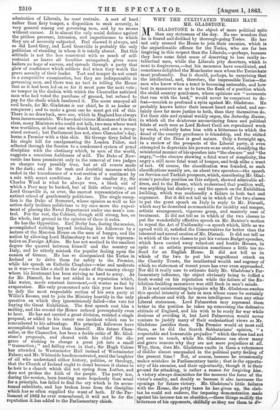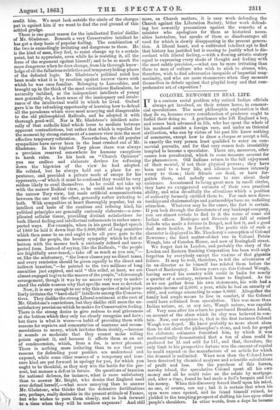WHY THE CULTIVATED TORIES HATE MR. GLADSTONE.
MR. GLADSTONE is the object of more political spite than any statesman of the day. No one wonders that he is feared and disliked by thorough-going Tories. He has not only -crossed the House to join their enemies, which is the unpardonable offence for the Tories, who are far less forgiving in this respect than the Liberals,—perhaps, because they have some faint sense of deserving to lose really in- tellectual men, while the Liberals pity deserters, which is next to forgiveness,—but his measures have conciliated, and sometimes delighted the Manchester men whom the Tories hate- most profoundly. But it should, perhaps, be surprising that the intellectual, and, therefore, the impressible Tories—the men who know when a tenet is becoming untenable, and how best to manceuvre so as to turn the flank of a position which the stolid country gentlemen, whose opinions are "covenants that run with the land," would never be competent to de- feat—nourish so profound a spite against Mr. Gladstone. He probably knows better their inmost heart and mind, and cer- tainly does far more justice to both, than they themselves do_ Yet their able and cynical weekly organ, the Saturday Review, in which all the dexterous unconvincing fence and political feints of such men as Lord Robert Cecil are reproduced week by week, evidently hates him with a bitterness to which the dread of the country gentlemen is friendship, and the stilted ferocity of the Times is good nature. Only a fortnight ago, in a review of the prospects of the Liberal party, it even attempted to depreciate his powers as an orator, classifying the ministerial manner of his speeches into "the obscure" and "the angry,"—the obscure showing a fatal want of simplicity, the angry a still more fatal want of temper, and bokla alike a want- of tact. Of course, the classification was founded, as such- classifications usually are, on about two speeches—the speech on Servian and Turkish prospects, which, considering Mr. Glad- stone's peculiar position on this subject, showed admirable ad- dress, and to the House, which understood that position well, was anything but shadowy; and the speech on the Exhibition building, which was confessedly a failure in both tact and argument. Bat it did not tell us in which -of the two classes- to put the great speech on Italy in reply to Mr. Disraeli, which may be described as remarkable for lucidity and temper, artistic arrangement, vigorous grasp, and masterly ease of treatment. It did not tell us in which of the two classes to- put the wonderfully effective speech on Mr. Buxton's motion_ to repeal the Act of Uniformity—a speech which, little as we agreed with it, satisfied the Conservatives far better than the laboured and unreal oration of Mr. Disraeli. It did not tell us in which of the two classes to put his various Budget speeches, which have carried away reluctant and hostile Houses, in spite of an artistic presentation sometimes a little too re- fined for an English House. It did not tell us in which of the two to put his magnificent attack on the Charity Trusts, the intellectual wealth and cogency of which no statesman of recent years has ever even approached. Nor did it really care to estimate fairly Mr. Gladstone's Par- liamentary influence, the object obviously being to inflict a fresh wound on his reputation while the failure of the Ex- hibition-building manceuvre was still fresh in men's minds.
It is not uninteresting to inquire why Mr. Gladstone- excites this special intensity of hate in men whose cause lie certainly pleads oftener and with far more intelligence than any other Liberal statesman. Lord Palmerston may represent them better in the position he takes up concerning the defensive attitude of England, and his wish to be ready for war while desirous of avoiding it, but Lord Palmerston would never venture to justify many of their ecclesiastical views as Mr. Gladstone justifies them. The Premier would at most call them, as he did the Scotch Sabbatarians' opinion, "a respectable and honourable prejudice" which the time had not yet come to touch, while Mr. Gladstone can show many and grave reasons why they are not mere prejudices at all. Why, then, does Mr. Gladstone excite in them a vehemence of dislike almost unequalled in the political party feeling of the present time ? Not, of course, because he occasionally makes mistakes in Parliamentary tactic ; that is the opportu- nity of his enemies, and their opportunity, though it is their- ground for attacking, is rather a reason for forgiving him. A victory always diminishes for the moment the force of the victor's enmity, and doubly so because it also increases the openings for future victory. Mr. Gladstone's little failures with the House, the petty taxes he has given up, the club- tax he could not enforce, the imposing demonstration made against his income. tax on charities,—these things mollify the bitterness of his opponents, skilfully as they use them to clis- credit him. We must look outside the circle of the charges put in against him if we want to find the real ground of this settled grudge. There is one great reason for the intellectual Tories' dislike of Mr. Gladstone. Beneath a very Conservative intellect he has got a deep basis of popular feeling. The combination of the two is exceedingly irritating and dangerous to them. He is the kind of man, they feel, to resist change up to a certain point, but to appreciate, even while he is resisting it, all the force of the argument against himself; and to be so much the more dangerous when he does change, from his thorough know- ledge of all the fallacious subtleties and temporary hiding-places of the defeated logic. Mr. Gladstone's political mind has been made what it is by reaction against narrow views with which he was once familiar. Belonging to Lancashire, and brought up in the thick of the most contentious Radicalism, he naturally imbibed, as the independent intellects of young men generally do, a keen sense of the inadequacy and intole- rance of the intellectual world in which he lived. Oxford gave him the refreshing opportunity of learning how to defend all the paradoxes which were most annoying and disagreeable to the old philosophical Radicals, and he adopted it with thorough good-will. Nor is Mr. Gladstone's intellect natu- rally of that catholic kind which loves to mediate between apparent contradictions, but rather that which is repelled for the moment by strong statement of a narrow view into the most effective temporary refutation. Nevertheless, the old popular sympathies have never been in the least crashed out of Mr. Gladstone. In his highest Tory phase there was always a provision reserved somewhere for humane exceptions to harsh rules. In his book on "Church Opinions" you see endless and elaborate devices for softening down the bigotries of the view ho had adopted. He refuted, but he always held out a place for re- pentance and provided a private mode of escape for his opponent; —of which it must be confessed they would be very seldom likely to avail themselves. As he could not take up with the narrow Radical view, so he could not take up with the narrow Tory view, but Made artificial communication between the one and die other, generally rather irritating to both. With sympathies at heart thoroughly popular, but an intellect and taste of the cautious and refinine.p kind, his political principles arc generally curiously elaborate—a com- plicated cellular tissue, providing distinct satisfactions for both liberal feeling and intellectual refinements in rather unex- pected ways. For example, when in his great Budget speech of 1860 he laid it down that the 2,000,000/. of long annuities which then came to an end ought to be all pure gain to the masses of the people, the hearty sympathy which he felt at bottom with the masses took a curiously defined and unex- pected form. Instead of saying, like the Radicals, "the people are frightfully over-taxed,--- take off as much as you can,"— or, like the aristocracy, "the lower classes pay no direct taxes, and every remission should be given equally to the direct and indirect taxation,"—he pointed to the two millions of long annuities just expired, and said "this relief, at least, we are almost engaged togive to the masses of the people," a fairenough arrangement, though it was by no means very easy to under- stand the subtle reasons why that specific sum was so devoted. Now, it is easy enough to see why this species of mind pecu- liarly irritates the "hard-shell" intellects among the Conserva- tives. They dislike the strong Liberal sentiment at the root of Mr. Gladstone's convictions, but they dislike still more the un- satisfactory provisions which he makes for Conservative feeling. There is the strong desire to give redress to real grievances at the bottom which they only too clearly recognize and hate ; but there is what is worse—a habit of providing them with reasons for reprieve and commutation of sentence and recom- mendations to mercy, which irritates them doubly,—because it sounds so moderate that they cannot make telling points against it, and because it affects them as an act of condescension, which, from a foe, is never pleasant. There is nothing more irritating than to see that your reasons for defending your position are understood and exposed, while some other reasons of a temporary and inse- cure kind are put forward in apology for you, for which you ought to be thankful, as they may win the battle for the pre- sent, but menace a defeat in future. On questions of taxation for national defence, for instance, what is more satisfactory than to answer Mr. Bright, who denies that England need ever defend herself,—what more annoying than to answer Mr. Gladstone, who thinks that the defensive fortifications are, perhaps, really desirable in the present attitude of France, but who wishes to pare them closely, and to look forward to a time when they will be needless expenses? And still more, on Church matters, it is easy work defending the Church against the Liberation Society, bitter work defend- ing her cowardly precautions against the remarks of a minister who apologizes for them as historical neces- sities heretofore, but speaks of them as disadvantages all need for which is slowly disappearing in the present genera- tion. A liberal heart, and a cultivated intellect apt to find that history has justified but is ceasing to justify what is dis- cordant with liberal feeling,—with a flowing artistic oratory equal to expressing every shade of thought and feeling with the most subtle precision,—what can be more irritating than these to men of culture who wish to stick to abuses, who, therefore, wish to find adversaries incapable of impartial mag- nanimity, and who are mere stammerers when they measure themselves in debate against that playful irony and that com- prehensive art of exposition ?































 Previous page
Previous page